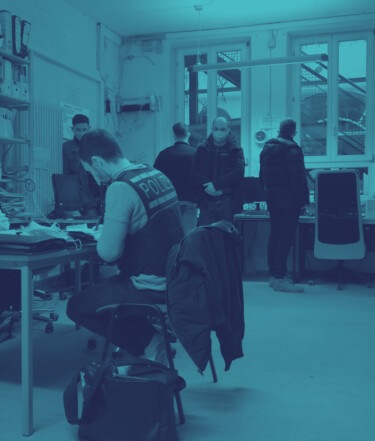
Criminal law provision prohibits publication of documents in ongoing court proceedings - and thus jeopardises freedom of the press
We oppose the criminal law provision § 353d and support Arne Semsrott, the editor-in-chief of FragDenStaat, in criminal proceedings brought against him for the prohibited reporting on court proceedings. The trial took place on October 16 and 18 2024 at the Berlin I Regional Court.
On 22 August 2023, the editor-in-chief of the information and research platform FragDenStaat, Arne Semsrott, reported on investigative measures against the Last Generation and a journalist from the independent radio station Radio Dreyeckland and, in the course of this, published several relevant court decisions with parts blacked out. A few weeks later, Semsrott learnt that the Berlin public prosecutor's office had opened preliminary proceedings against him. The accusation: violation of the criminal provision § 353d No. 3 StGB. Semsrott deliberately took this risk, as he also wrote in the articles. The journalist points out that the criminal provision urgently needs to be reformed or interpreted by the courts in accordance with the constitution and in line with European human rights. The publication of the documents was supposed to initiate this.
At the end of January 2024, the Berlin public prosecutor's office brought charges against Arne Semsrott in the Last Generation complex. In April 2024, the Berlin I Regional Court opened the main proceedings against Arne Semsrott - the trial will take place on October 16 and 18, 2024. The criminal proceedings for the published decision in the Radio Dreyeckland case were discontinued.
CRIMINAL PROVISION SECTION 353D NO. 3 STGB IS UNCONSTITUTIONAL
This criminal provision prohibits, without exception, any publication of the wording of documents from ongoing criminal proceedings prior to the oral hearing. The standard therefore prevents the publication by the press of even verbatim quotations from court decisions in criminal proceedings that have not yet been concluded. It is permitted to paraphrase the content of documents. However, it is often precisely the exact wording that is important in order to deal with the arguments. The fact that the standard prohibits precisely these quotations severely restricts the freedom of the press.
The jointly drafted statement to the public prosecutor's office states that the criminal provision § 353d no. 3 StGB is unconstitutional as it disproportionately restricts the freedom of the press. In the case of Semsrott's article, the reporting served to thematise the actions of the courts against the climate movement 'Last Generation' and against the non-profit broadcaster Radio Dreyeckland and to critically examine the reasoning behind the decisions.
To this end, he analysed the arguments of the ordering courts in depth and provided the wording of four of the decisions from the widely discussed criminal proceedings, albeit partially redacted. As a result, the Berlin public prosecutor's office initiated preliminary proceedings against him. "In ongoing criminal proceedings such as the Last Generation, it must be permitted to quote from official documents if it is in the public interest. If necessary, the constitutional court must clarify this!" criticised the defendant Arne Semsrott.
EGMR AND BGH EMPHASISE: INTERFERENCE WITH FREEDOM OF THE PRESS MUST ALWAYS BE WEIGHED UP
The question of the extent to which there is a public interest in court decisions falls within the core area of journalistic work. This necessary balancing of interests is completely prevented at this point by the publication ban, which is subject to criminal prosecution without exception. Both the European Court of Human Rights (ECtHR) and, most recently, the Federal Court of Justice (BGH) emphasise in their case law that a balance must always be struck with the freedom of the press and that criminal liability should not be automatic. The BGH even specifically questioned the constitutionality of the standard.
The ban on publishing documents during ongoing proceedings makes it more difficult to report on criminal proceedings and therefore disproportionately restricts the freedom of the press. The aim of the proceedings and the statement is for the Federal Constitutional Court to review the standard.



